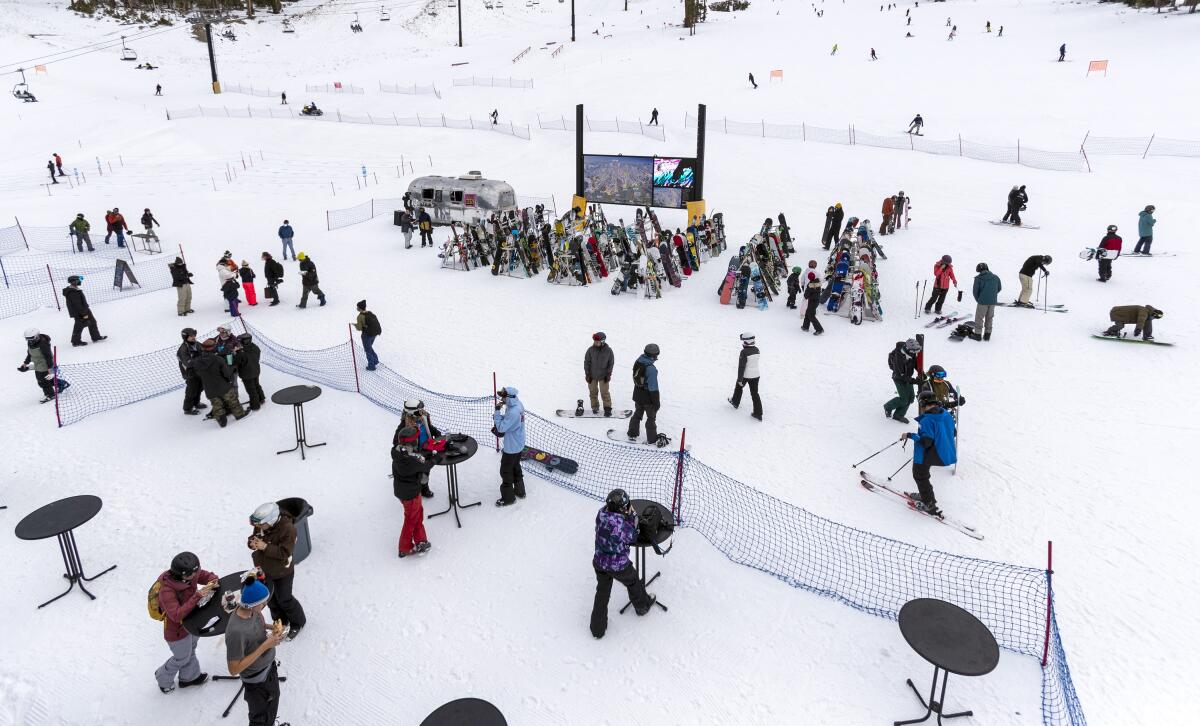At these California ski resorts, slopes are open, but what about lodging?

Mammoth Mountain, Lake Tahoe and other California ski resorts remained open Wednesday while trimming operations to fit a new state COVID-19 order. But skiers, boarders and leisure travelers are banned from overnight stays in lodgings in Southern California and the Eastern Sierra, and a similar ban takes effect as Friday begins in the Greater Sacramento area, which includes Tahoe.
“All existing reservations from Monday, December 7, 2020 are required to be cancelled and no reservations are allowed to be taken,” said a statement from officials in Mono County, which includes Mammoth Mountain and the town of Mammoth Lakes.
“This local order is consistent with intent of the state order, which was less clear,” Dr. Tom Boo, Mono County’s public health officer, said Sunday in a statement. Like the state order that was announced Thursday and imposed at 11:59 p.m. Sunday, the short-term rental lodging ban does not cover essential workers, homeless and other displaced people.
“Everybody needs to be prepared to be flexible. Things are going to change fast. Check everything,” said Tim LeRoy, spokesman for Mammoth Mountain.
In the Lake Tahoe area — part of the Greater Sacramento region, as defined by the new restrictions — resorts remain open. But llisure-traveling overnight guests will be forbidden because the region’s ICU bed capacity has fallen below 15%, triggering tighter rules.
Some resorts in North Lake Tahoe are in Nevada, where regulations have been less stringent.
Badger Pass Ski Area, near Yosemite, has announced its downhill and cross-country operations will remain closed through the winter of 2020-21 because of the COVID-19 pandemic.
Get The Wild newsletter.
The essential weekly guide to enjoying the outdoors in Southern California. Insider tips on the best of our beaches, trails, parks, deserts, forests and mountains.
You may occasionally receive promotional content from the Los Angeles Times.
As hospitalizations soar and Sacramento struggles to get the pandemic in check, several ski and lodging industry executives said they’re still seeking clarity from the state on what is permitted, what is discouraged and what is forbidden.
Mammoth Mountain remains open for skiing and snowboarding, but its lodging “will be limited to homeowners and critical infrastructure services,” a resort statement said. For the 21-day duration of the current state order, LeRoy said, the resort won’t be taking reservations for lodging, which include the Mammoth Mountain Inn, the Village Lodge, Juniper Springs Resort, the Westin Monache Resort, Tamarack Lodge and a collection of rental homes.
The Mammoth resort’s food and beverage operations are take-out only. Its retailers will be open at 20% of capacity (before Monday, that figure was 25%), and lodges can be accessed for restrooms, lockers and guest services, but “guests will be required to limit their time inside.”
So far, Mammoth management has told visitors they “can change or cancel your lift ticket, lesson, rental or activity reservation up to 3 full days prior to the scheduled date for a full refund.”
If you make changes on shorter notice (but still at least a day ahead), the resort said it would issue an Activity Change Voucher “for the full value of the activity cost.”
For same-day changes or cancellations, the policy on the Mammoth website calls for “a full forfeit of your payment.” But Mammoth spokesman Leroy said the resort may be able to help some customers in that situation. He suggested that they email [email protected]
At Squaw Valley Alpine Meadows in Placer County near Lake Tahoe, a spokeswoman said the resort would remain open and operating, its hotels accepting only essential workers.
Among ski resorts statewide, “we’re saying you need to follow the state’s order. That’s the plain-and-simple of it,” said Mike Reitzell, president of the trade group Ski California. Though the leisure lodging ban changes things substantially, he said, “there are people that live near our resorts and can go to our resorts.”
Mono is among the 11 counties in the state order’s newly defined Southern California region. In the wake of questions about the order, that county issued a “clarification” to make clear that condo owners are free to stay in their residences, but that leisure visitors should stay away for the duration of the 21-day order — not just from hotels but also from all short-term lodging, including rental units, residences, RV parks and campsites.
According to the county clarification, “There shall be no renting or leasing of a [l]odging [f]acility for leisure or vacation travel,” and it gives county officials the authority to decide who should be exempted as an essential worker.
In hopes the order will be lifted after 21 days, Mammoth Mountain plans to resume accepting reservations beginning Dec. 27. Information on reservation changes and cancellations at the resort is offered on its website.
The state order for Southern California also covers the mountains closest to Los Angeles, where resorts often focus on day-trip visitors and don’t operate lodging. Skiing, boarding and sledding continue at Snow Valley and Big Bear Mountain Resort (which includes Snow Summit and Bear Mountain) in the San Bernardino Mountains. In the San Gabriel Mountains, Mountain High in Wrightwood is open.
Get inspired to get away.
Explore California, the West and beyond with the weekly Escapes newsletter.
You may occasionally receive promotional content from the Los Angeles Times.
It’s unclear how well lodging operators understand or intend to follow the governor’s order. When a reporter called the Travelodge by Wyndham in Big Bear Lake on Monday to ask whether leisure guests were being accepted, the answer was yes.
State officials have urged Californians, with increasing urgency, to “stay in your county if you can. Don’t drive more than 2-3 hours.”
The state’s guidance says that when a regional stay home order is in effect, as it is in Southern California, “hotels and lodging can only offer accommodation for COVID-19 mitigation and containment measures, treatment measures, accommodation for essential workers, or providing housing solutions, including measures to protect homeless populations.”
At a news conference Monday, Newsom was asked whether leisure stays in hotels are discouraged or legally forbidden in regions with ICU availability is less than 15%. “Lodging can be open for essential workers only, not for tourists, not for leisure,” the governor said.
He was followed by Mark Ghaly, the state secretary of Health and Human Services, who said in those regions, “We ask you not to travel for leisure.” He added that the policy would be clarified soon.
More to Read
Sign up for The Wild
We’ll help you find the best places to hike, bike and run, as well as the perfect silent spots for meditation and yoga.
You may occasionally receive promotional content from the Los Angeles Times.







